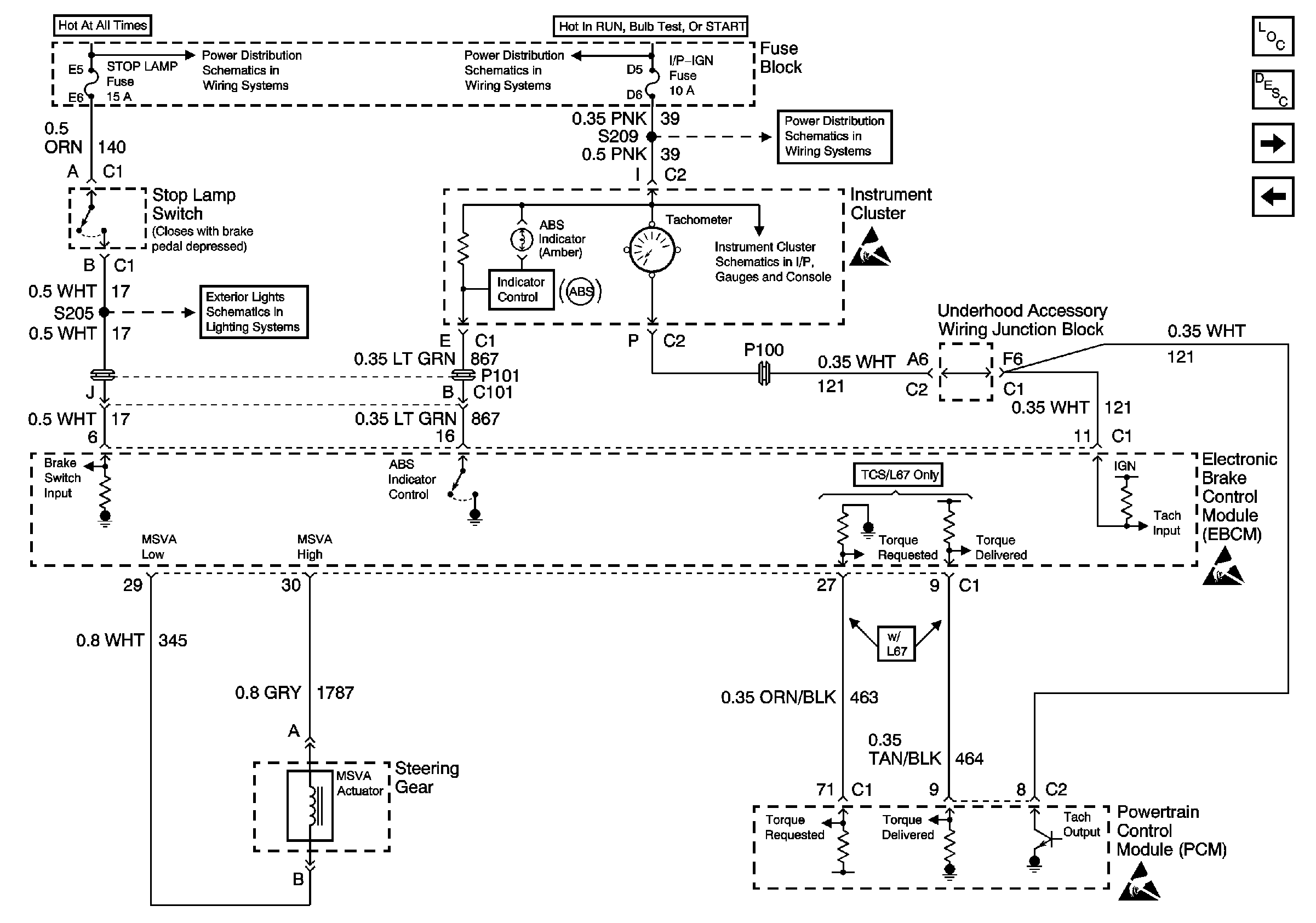Circuit Description
Traction Control is simultaneously controlled by the EBTCM and the PCM. The PCM sends a DELIVERED TORQUE message via a Pulse Width Modulated (PWM) signal to the EBTCM confirming the delivered torque level for proper Traction Control system operation. The EBTCM supplies the pull up voltage.
Conditions for Setting the DTC
DTC C0244 can be set anytime when ignition voltage is present. A malfunction exists if the PWM signal is out of range or no signal is received for a period of 2 seconds.
Action Taken When the DTC Sets
| • | A malfunction DTC is stored. |
| • | The TCS is disabled. |
| • | The TRAC OFF indicator is turned on. The ABS remains functional. |
Conditions for Clearing the DTC
| • | Condition for DTC is no longer present and scan tool clear DTC function is used. |
| • | 100 ignition cycles have passed with no DTC(s) detected. |
Diagnostic Aids
| • | It is very important that a thorough inspection of the wiring and connectors be performed. Failure to carefully and fully inspect wiring and connectors may result in misdiagnosis, causing part replacement with reappearance of the malfunction. |
| • | If an intermittent malfunction exists refer to General Electrical Diagnosis in Wiring Systems. |
| • | Possible causes for DTC C0244 to set: |
| - | Open in CKT 464. |
| - | CKT 464 shorted to ground or voltage. |
| - | Communication frequency problem. |
| - | Communication duty cycle problem. |
| - | CKT 464 has a wiring problem, terminal corrosion, or poor connections. |
| - | EBTCM not receiving information from the PCM. |
Test Description
The numbers below refer to step numbers on the diagnostic table.
Step | Action | Value(s) | Yes | No |
|---|---|---|---|---|
SCHEMATIC REFERENCE: ABS Schematics
| ||||
1 | Was the Diagnostic System Check performed? | -- | ||
2 | Check that grounds, G113 and G205 are clean, tight and free of damage. Refer to Power and Grounding Components in Wiring Systems. Were any loose, damaged, or corroded grounds found? | -- | ||
3 | Repair ground as necessary. Refer to Wiring Repairs in Wiring Systems. Is the repair complete? | -- | -- | |
Is the delivered torque within the range specified in the value(s) column? | 0N·m | |||
5 | Replace the EBTCM. Refer to Electronic Brake and Traction Control Module Replacement . Is the replacement complete? | -- | -- | |
Is the voltage within the range specified in the value(s) column? | Battery Volts | |||
7 |
Is the voltage within the range specified in the value(s) column? | Greater than 1V | ||
8 | Repair CKT 464 for a short to voltage. Refer to Wiring Repairs in Wiring Systems. Is the repair complete? | -- | -- | |
9 |
Is the resistance within the range specified in the value(s) column? | OL (infinite) | ||
10 | Repair CKT 464 for a short to ground. Refer to Wiring Repairs in Wiring Systems. Is the repair complete? | -- | -- | |
11 |
Is the resistance within the range specified in the value(s) column? | 0-2 ohms | ||
12 | Suspect PCM. Refer to Powertrain On Board Diagnostic (OBD) System Check in Engine Controls 3.8. Is the Repair complete? | -- | -- | |
13 | Repair CKT 464 for an open. Refer to Wiring Repairs in Wiring Systems. Is the repair complete? | -- | -- | |

